Coronavirus: Inside Scotland’s testing superlab
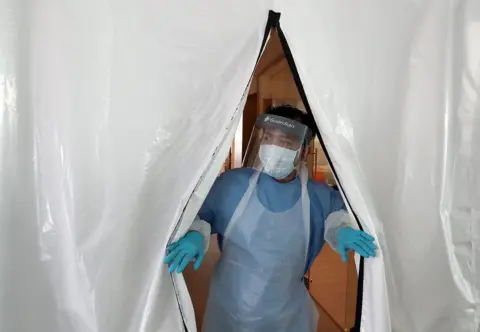 AFP
AFPScientists have begun work at Scotland's coronavirus testing "superlab", aiming to transform the way we test for the virus.
Staff dressed in full protective gear including gloves, visors and masks move between a series of rooms that work like an "industrial scale" production line of samples, testing machinery and computer output.
The experts here believe Lighthouse Labs like this one in Glasgow - one of just three similar sites in the UK - could be one way out of the current lockdown.
Why is testing so important?
The World Health Organization has said the key to combating the coronavirus epidemic is to "test, test, test".
The UK has been criticised for falling behind other countries such as Germany in the number of tests it does.
This "superlab" based in repurposed university laboratories at the Queen Elizabeth Hospital in Glasgow is part of the UK and Scottish government's answer.
It is one of three in the UK. The others are in Milton Keynes and Cheshire in England.
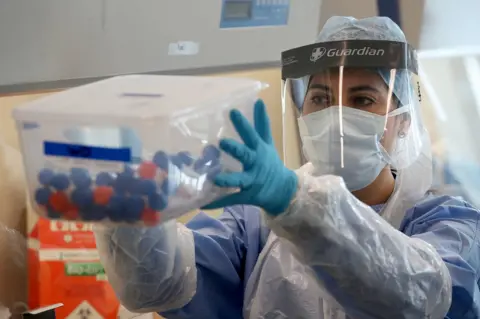 PA Media
PA MediaHow does testing work?
The tests being analysed here are to see if somebody currently has Covid-19. Other tests in the future will look at antibodies to work out if someone had the disease in the past.
Staff process a swab of the nose or throat that has been sent to the lab to look for signs of the virus's genetic material.
Each test has to be securely taken out bags, logged and placed on racks, before the samples are transferred from tubes to plates. The whole testing process takes between two-and-a-half and three hours.
How many tests can the superlab do?
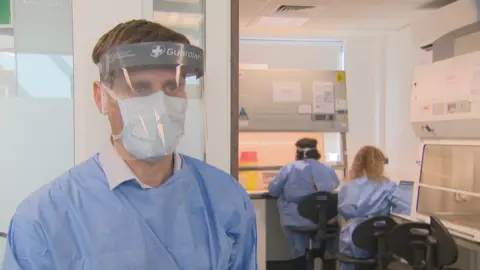
The lab has only been open for two days and head scientist Dr Stuart McElroy says they have the capacity of "many hundreds" tests a day.
The aim is to expand that to "many thousands" over the next few weeks.
Dr McElroy says being part of the network of superlabs allows the teams to create standard processes and quality control as well as learning from each other. They can also distribute samples efficiently across the three sites.
Who will be tested?
Most coronavirus tests are currently carried out in hospitals on seriously ill patients.
However, this lab focuses on testing key workers such as NHS and care professionals. These tests are carried out at drive-through centres. In Scotland, there are sites at Glasgow, Aberdeen and Edinburgh airports with a further hub planned for Inverness. Currently health boards also carry out their own key worker tests.
The hope from staff at the Lighthouse Lab is that, as it scales up, they will move beyond key workers into widespread community testing of the general public.
Who works at the superlab?
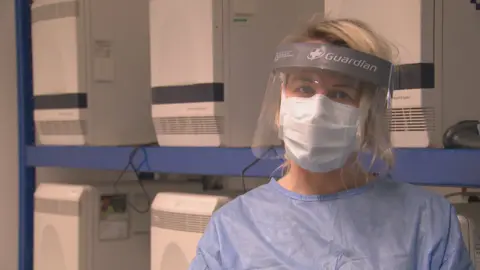
The lab is a collaboration between the University of Glasgow, the private sector, the Cancer Research UK Beatson Institute and the NHS, and is mostly staffed by volunteers.
The lab has also been set up with help from the armed services and has logistics help from accountancy firm Deloitte
Dr Jodie Hay, who normally works on testing for cancer, says the skills and techniques she uses in that work is similar to here.
"The nicest thing about this is being able to get people back into the front line," she says.
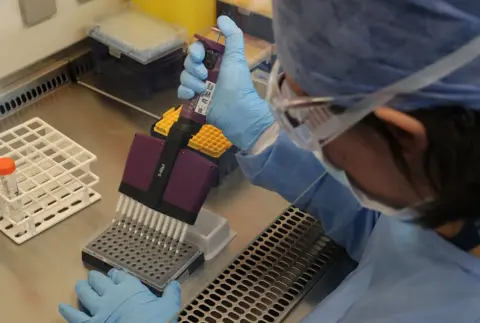 Andrew Milligan
Andrew MilliganWhat are the targets for testing?
UK health secretary Matt Hancock has set an ambitious target of 100,000 tests a day by the end of this month although there has been scepticism about whether the target can be reached.
The Scottish government has set a different target of 3,500 tests a day. They say this is broadly comparable to a target of 25,000 a day set by the UK government for NHS and public health labs.
This superlab is about taking the next step beyond these targets and taking up testing to and even past the 100,000 tests a day.
What are the issues?
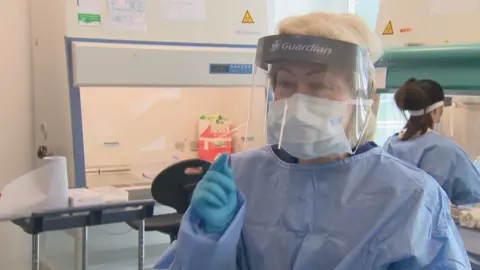
The whole world is trying to increase testing and there have been issues around every part of the process.
There are reported difficulties of getting staff to drive-through centres. There have also been shortages of swabs for taking the test, chemical "reagents" for the testing process, as well as the testing machines.
Prof Dame Anna Dominiczak, who leads the team who developed the laboratory, says they want to expand to create a further area at the Glasgow lab to develop automation but she acknowledges there are currently no machines to buy.
Will this help us get out of lockdown?
Testing may be key to getting us out of lockdown but it is just one part of a process. The idea is to identify new infected cases as quickly as possible, trace everyone they have met and then isolate them from the rest of the population.
This is the public health mantra of "test, trace, isolate".
There has been hope that an NHS smartphone app will help speed up that process. But there is still likely to be a small army of contact tracers hitting the phones and tracking down potentially infected people.
But the staff here are full of hope. As Prof Dominiczak says: "I am hugely optimistic we will win with the virus."

- A SIMPLE GUIDE: How do I protect myself?
- TESTING: Can I get tested for coronavirus?
- AVOIDING CONTACT: The rules on self-isolation and exercise

